Selecting the Right Materials For Your Project: Best Countertop Materials Edition
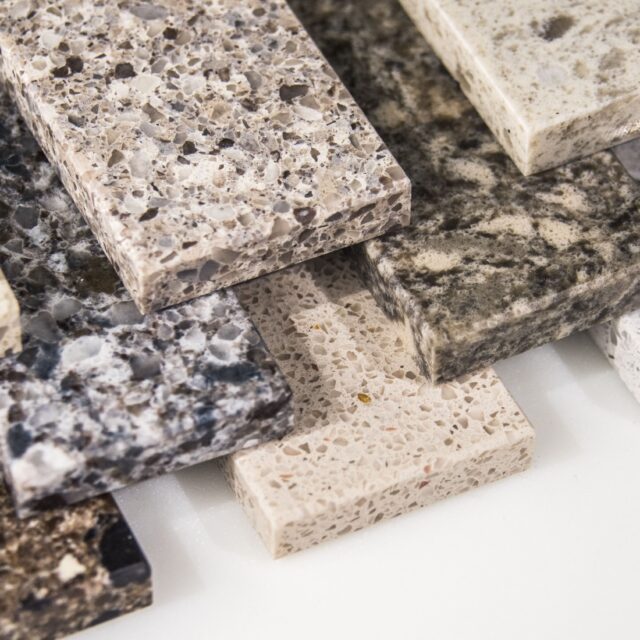
- Written by: jlbmdev

When you look at a kitchen, one of the first things you might notice is the countertops. This can be in a positive sense or a negative one. Countertops can change the whole aesthetic and design of your kitchen.
We’re continuing our series on choosing the best materials for your project and focusing on the materials for new countertops. In this third installment, we’ll go over the different types of countertop materials available to you, and the pros and cons of each. So by the time you’ve finished reading, you’ll be confident in your choice.
With all the different types of kitchen countertop materials to choose from, how do you know what to pick?
A popular option that people install in their homes is natural stone countertops. They like having a natural material and it’s known for its durability. There are several types of natural stone to pick from that we’ll break down below.
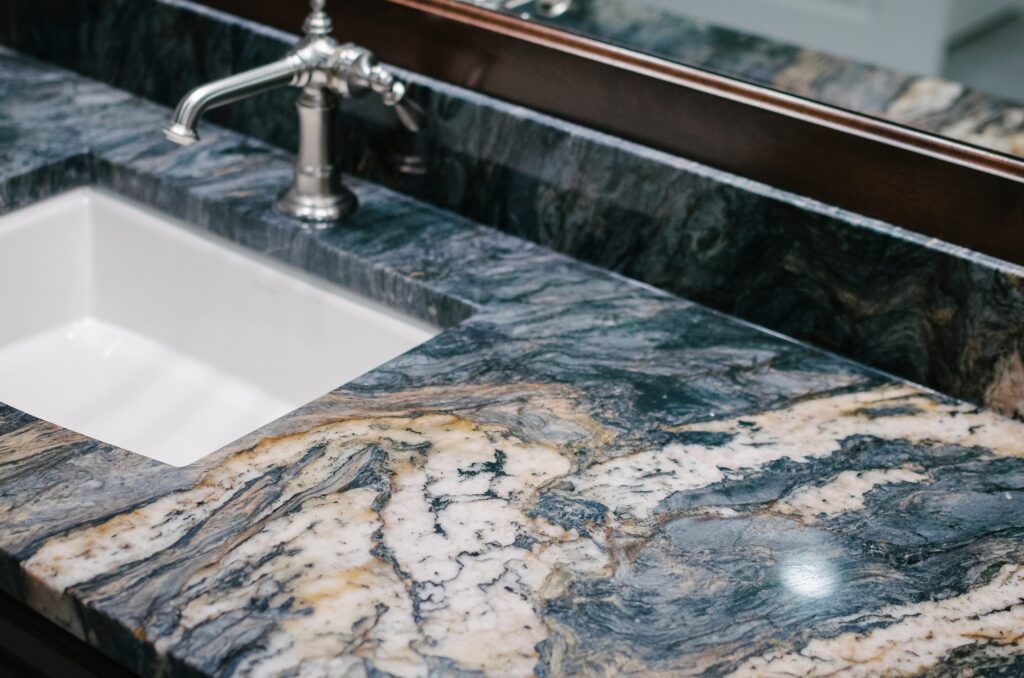
Granite is a hard igneous rock consisting mainly of quartz, mica, and feldspar. It’s often used as a building stone like for columns or other monuments.
Granite countertops come in a wide variety of patterns and colors. They’re also easy to clean, which makes them a lower maintenance option.
It’s also considered a durable material that won’t easily scratch. This makes it a good design choice for someone who is looking for both function and fashion.
However, granite is an expensive material so expect to pay more for it. While it’s not the priciest option, it will cost you more than other ones, like solid surfaces or tiles.
Granite kitchen countertops also need to be sealed at least once a year. This helps prevent any bacterial growth. So while it’s minimal, there is still some maintenance involved.
Another drawback to granite is that it weighs a lot. Due to this weight, installation isn’t a DIY job. You’ll need to hire professional installers so they can install your countertops. Because you don’t want to spend the price on granite slabs, and then break them during installation.
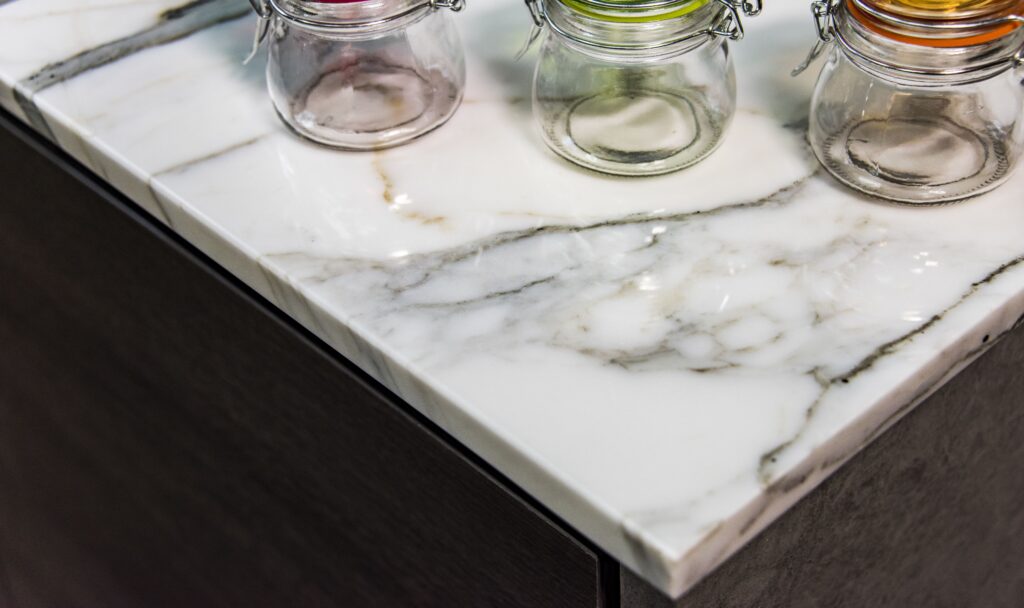
Marble is one of the more classic choices for kitchen countertops. Since no two marble slabs are the same, you can have a unique countertop. You can also decide if you want a honed or polished finish.
Marble countertops are unaffected by heat so can place hot pans/oven trays on it without potholders or trivets.
One of the drawbacks of marble countertops is they stain easily so you need to clean up messes. Part of this is due to marble being relatively soft and porous. To help prevent staining, you’ll need to seal it.
Since marble is even heavier than granite, you’ll need professional installation.
Soapstone is a natural stone that is mostly made of talc. These countertops come in a wide variety of colors and patterns.
Soapstone is more pliable than granite due to the talc. This means it’s less brittle than granite so it reduces the chance of cracking. This makes it good for a DIY-er. If you have a circular saw with a stone cutting blade, then you can cut a slab of soapstone yourself and install it.
A benefit of soapstone is it’s not porous so clean-up is easy and it won’t get stained by acidic foods like citrus or tomatoes.
Like granite and marble, soapstone is an expensive material. And while generally hard-wearing, it can scratch.
If natural stone isn’t what you’re looking for, another option is engineered stone might be an option. We’ll break down your options and highlight the pros and cons of each one.
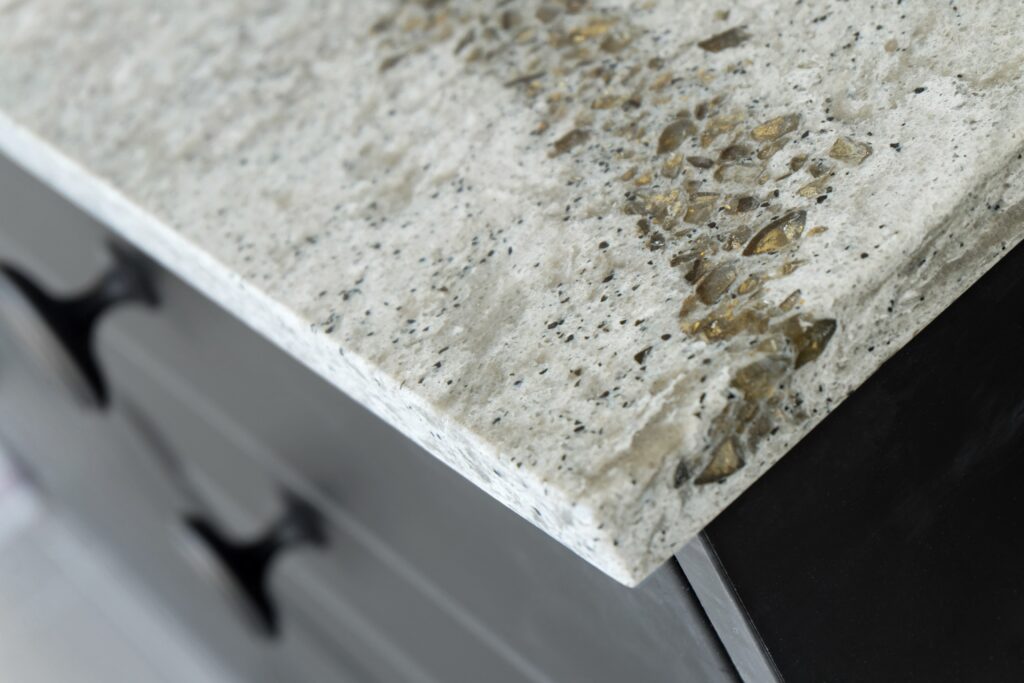
Quartz counters are a mix of natural quartz and resin so they’re a durable material for kitchen countertops. They come in a variety of colors, patterns, and finishes so it’s easy to find one to fit with your design aesthetic.
Quartz countertops are considered non-porous so they’re stain-resistant. So there’s no need to apply a sealer, which also makes them a lower maintenance option.
Due to the resin, heat can damage the quartz and can cause permanent discoloration, white spots, and other damage. Make sure to use a trivet or potholder when taking hot pans out of the oven.
Like granite and marble, it’s an expensive material so quartz might not work with your budget. While it can be installed by nonprofessionals, you’ll likely want to get professional help since it’s a heavy material to work with.
Solid surface counters are at a lower price point than natural stones so it’s a good alternative for someone who’s looking for the look of stone but has a budget. They’re available in many colors and patterns so you can create a custom look for your kitchen.
Since they’re heat resistant, they’re a low-maintenance option and good for a high-traffic kitchen. While solid surface countertops can scratch easily, it’s easy to fix them with some sanding.
Solid surface counters are a synthetic material, which can turn some people off if they’re looking for natural products. They can also get deformed if exposed to heat for too long.
Ceramic tiles are one of the cheaper options for countertops. There’s a wide variety of colors, patterns, and styles to pick from. This makes it easy to create a custom countertop for your kitchen.
Another benefit of using ceramic tiles is that if a tile gets broken, it’s easy to replace it. So make sure you buy extra tiles when purchasing your materials.
Creating a ceramic tile countertop can be a DIY project so it can save you some money but it will be labor intensive. You also need to make sure you’re using a tile that’s rated to use on floors or countertops. Not just any tile will work as a countertop material.
One of the biggest drawbacks to ceramic tiles is that it’s hard to clean the grout, so your countertops can look dirty. You’ll also need to seal it to prevent bacteria buildup. Tiles can also get stained so make sure to clean up messes quickly.
Some alternate materials have gained popularity as kitchen countertops if natural or engineered stone options don’t suit your taste. They resemble natural stone but cost less, which is good for homeowners on a budget.
Concrete countertops are a good choice for homeowners who are trying to save some money as they can be a DIY project. Or you can purchase a pre-molded one if you aren’t as handy around the house.
With concrete, you can use a variety of finishes and stains to create a custom design. You can add patterns to your counters or keep them smooth.
They resemble natural stone but cost less, which again is good for homeowners on a budget.
Concrete is a higher maintenance option since it needs regular sealing and is prone to chipping. Due to its weight, you also might need to re-enforce your cabinets. However, it is immune to heat so you don’t need to use trivets or potholders.
While it’s a money saver, with you eliminating the labor cost and adding sweat equity, the raw materials are expensive. It’s not as easy as just buying the concrete and pouring it on a counter mold.
One of the concerns is if the concrete cracks when it dries. If this happens, then you can fill it with epoxy, which has its own challenges. So this is a project that should be done by an experienced DIY-er.
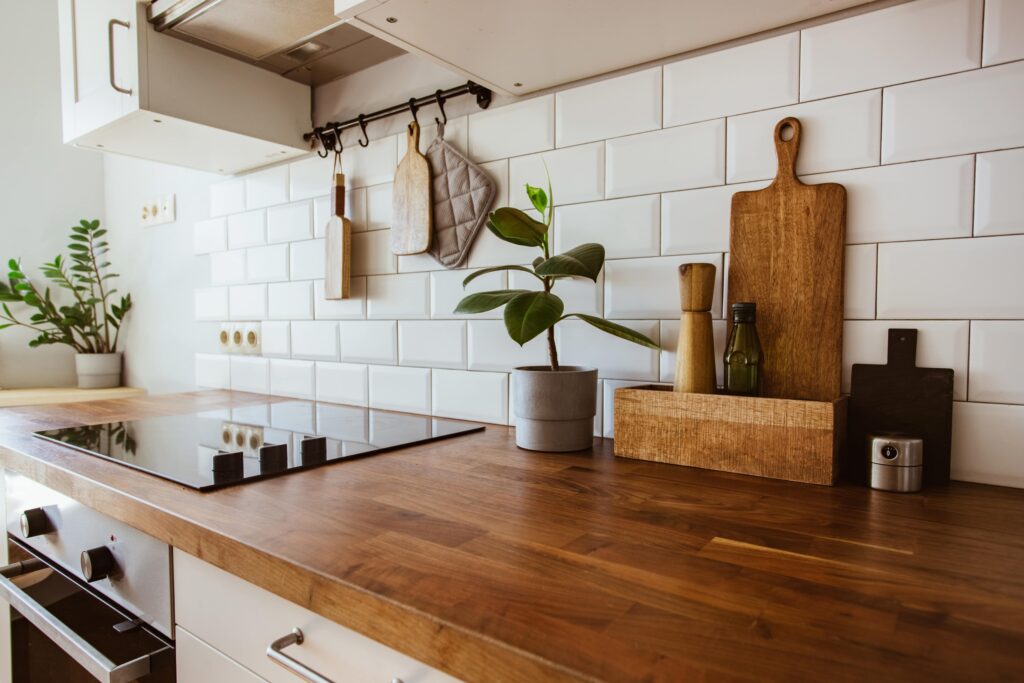
If you’re looking to bring in a natural element with warm tones, then butcher block countertops are a good choice. These countertops are dual-purpose since they are countertops and cutting boards.
And when you’re done, you can clean them like you would any other wooden cutting board so disinfecting and cleanup is easy.
However, butcher block countertops need regular oiling or sealing to keep germs and bacteria from settling in the wood. This makes them higher maintenance.
Wood can also get easily scratched or nicked, and it can warp due to humidity and heat. And you’ll also have to be mindful of stains on the wood. You can try sanding the wood but some people will consider these imperfections as giving the countertop character.
Another factor is price. The price of butcher block countertops can fluctuate depending on what type of wood you choose.
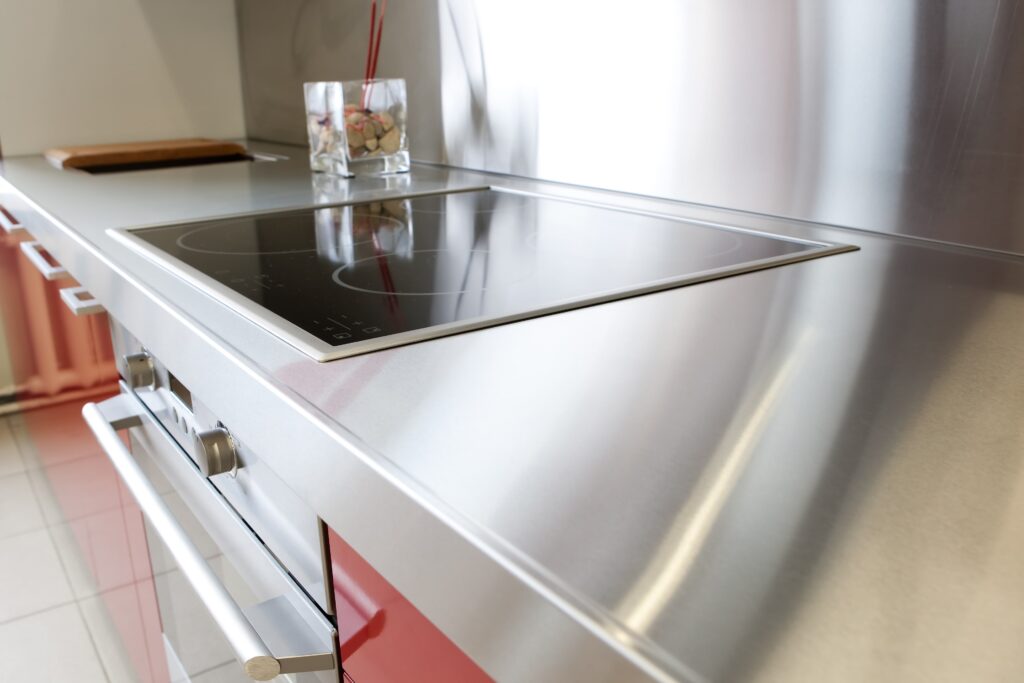
For a more industrial look, a kitchen countertop that people are gravitating towards is stainless steel. Stainless steel countertops are easy to clean, which makes them a good choice for a busy kitchen. They’re also durable and won’t easily scratch.
The material is impervious to heat and liquids so if something gets spilled on it, then the steel won’t get damaged. Even though it’s durable and won’t easily scratch, accidents happen and you can still mark up your stainless steel.
It’s one of the more expensive options but there are some ways to bring that cost down. You can work with a metal shop or a restaurant supply company when you’re ordering your kitchen countertops.
Though it’s easy to clean, it also easily shows fingerprints and smudges. So if you like a pristine kitchen, stainless steel might not be the best choice for you.
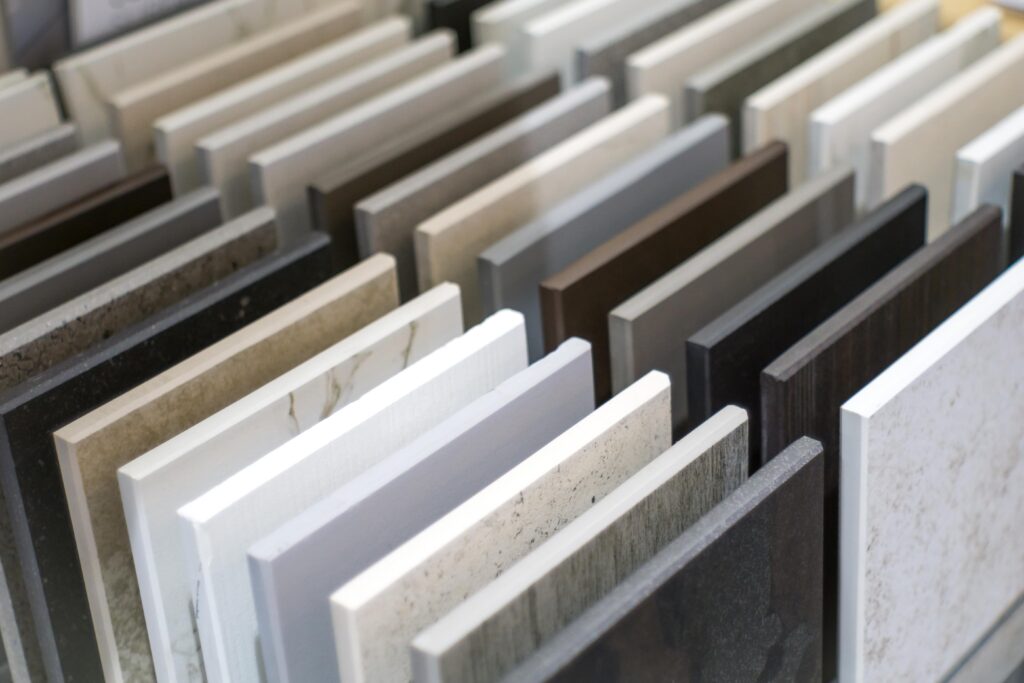
Ultimately, it comes down to several things, including your budget and personal preferences.
Each option has benefits and drawbacks, and researching your options before you start looking can help answer your questions.
To help you make your decision, we created this table to help you compare countertop materials.
| Type | Cost | Durability | Easily Stained | Maintenance |
|---|---|---|---|---|
| Granite | $$ | ✔ | ✘ | Low |
| Marble | $$$ | ✔ | ✔ | High |
| Soapstone | $$ | ✔ | ✘ | Low |
| Quartz | $$ | ✘ | ✘ | Low |
| Solid Surface | $ | ✔ | ✘ | Low |
| Ceramic Tile | $ | ✔ | ✔ | High |
| Concrete | $$ | ✔ | ✘ | High |
| Butcher Block | $$ | ✔ | ✘ | High |
| Stainless Steel | $$ | ✔ | ✘ | Low |
Before you decide on a kitchen countertop, there are a few questions to ask yourself that might change your final decision.
Your budget can dictate what materials you can purchase and even how much of your renovation you can do. If you won’t compromise on the materials or add to your budget, then you might only be able to afford half of your countertops and need to pick a less expensive material for the rest.
You’ll need to know the area of your kitchen countertop space so you know how much material to order. You want to make sure you order enough so you aren’t short on countertop material. You also don’t want to have too much extra material and waste money on a product you don’t need.
This question and your budget can affect what material you can afford.
Knowing how you will use your kitchen is essential when deciding on your countertops. Are you working daily in your kitchen or is it more of a showroom? If you’re using your kitchen every day then you’ll want something durable, like granite.
Or are you a neat freak or are you a messy cook who spills things? If you’re messy, then marble countertops might not be the best choice since they can easily stain.
Asking these questions can help you narrow down your options and help you make the best choice. Because if you start with the wrong kitchen countertop, that can cost you money down the road on repairs or even replacing it with something new.
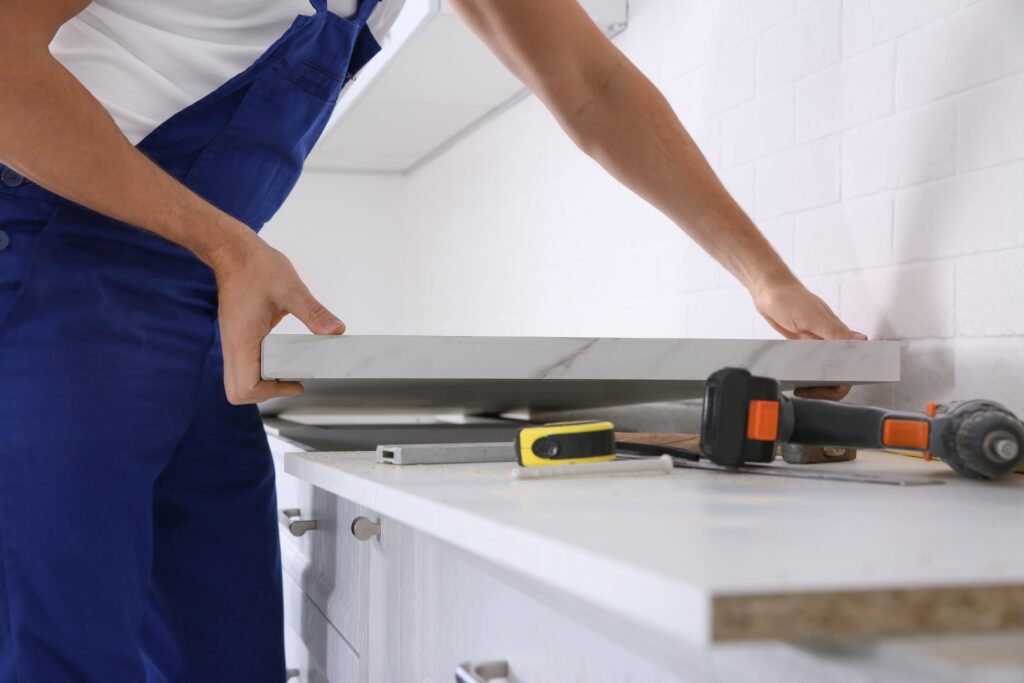
When you’re renovating your kitchen, you want to pick the best kitchen countertops for your home and not regret your choice.
With so many options, picking a new countertop can be overwhelming. By working with J&L Building Materials’ experts, we can show you all your product options and help make it easy to select the right kitchen countertops for your home and budget. We can also either work with your contractor or help you find the right one to finish your project.